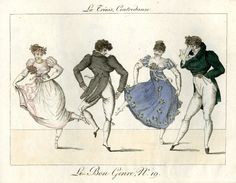by Donna Hatch
www.donnahatch.com
I share these with you partly to set the record straight about some common misconceptions, and partly just to celebrate the unique and remarkable era we know and love as the Regency.
 Chocolate — Chocolate was a bitter, hot drink like coffee, not the decadent dessert we know today. It was considered very decadent and only the finest chefs knew how to prepare it. Therefore, only the very rich drank it.
Chocolate — Chocolate was a bitter, hot drink like coffee, not the decadent dessert we know today. It was considered very decadent and only the finest chefs knew how to prepare it. Therefore, only the very rich drank it.
 Ankles — It was not scandalous for ladies to show their ankles. In fact, several drawings and engravings of the era show ladies with skirts barely reaching their ankles. Since their dancing slippers were similar to today’s ballerina flats, the ankles were clearly visible. As shoe styles changed from slippers into boots of the Victorian Era, it also became a sign of modesty to keep one’s ankles covered. Hence, showing ankles was scandalous during the Victorian Era, but not the Regency Era.
Ankles — It was not scandalous for ladies to show their ankles. In fact, several drawings and engravings of the era show ladies with skirts barely reaching their ankles. Since their dancing slippers were similar to today’s ballerina flats, the ankles were clearly visible. As shoe styles changed from slippers into boots of the Victorian Era, it also became a sign of modesty to keep one’s ankles covered. Hence, showing ankles was scandalous during the Victorian Era, but not the Regency Era.
Unmentionables — Ladies did not wear anything under their gowns except a shift or a chemise, stays which are similar to a corset but less restrictive, and stockings. Layers of petticoats would have messed up the slender silhouette of the Regency gowns. During very cold weather, ladies may have worn petticoats to stay warm however, it was not a common practice. And no, ladies did not wear pantaloons or pantalets either–those appeared during the next era along with all the layers of petticoats.
Annulments — Marriages in Regency England could not be annulled by non-consummation. Period.

Stale Bread — Due to the Napoleonic War and subsequent blockages, wheat was hard to come by. This meant that bread, a main staple in the Englishman’s diet, became scarce. In an attempt to prevent a massive shortage, Parliament passed the Stale Bread Act. This outlawed the sale and/or consumption of fresh bread, and only allow stale bread, or bread baked more than 24 hours ago, to be sold. Apparently stale bread filled bellies faster than fresh bread. Penalties for offense were severe, but as you can imagine, it was very hard to enforce. The government repealed it about a year later but the shortage persisted until after the war ended.
I hope you like some of the fun facts I shared with you today. My goal is always to provide carefully researched novels, rich in detail, with swoon-worthy heroes falling in love with heroines who are their match. My latest book, Courting the Countess, is about two such people.
www.donnahatch.com
I share these with you partly to set the record straight about some common misconceptions, and partly just to celebrate the unique and remarkable era we know and love as the Regency.
 Ankles — It was not scandalous for ladies to show their ankles. In fact, several drawings and engravings of the era show ladies with skirts barely reaching their ankles. Since their dancing slippers were similar to today’s ballerina flats, the ankles were clearly visible. As shoe styles changed from slippers into boots of the Victorian Era, it also became a sign of modesty to keep one’s ankles covered. Hence, showing ankles was scandalous during the Victorian Era, but not the Regency Era.
Ankles — It was not scandalous for ladies to show their ankles. In fact, several drawings and engravings of the era show ladies with skirts barely reaching their ankles. Since their dancing slippers were similar to today’s ballerina flats, the ankles were clearly visible. As shoe styles changed from slippers into boots of the Victorian Era, it also became a sign of modesty to keep one’s ankles covered. Hence, showing ankles was scandalous during the Victorian Era, but not the Regency Era.Unmentionables — Ladies did not wear anything under their gowns except a shift or a chemise, stays which are similar to a corset but less restrictive, and stockings. Layers of petticoats would have messed up the slender silhouette of the Regency gowns. During very cold weather, ladies may have worn petticoats to stay warm however, it was not a common practice. And no, ladies did not wear pantaloons or pantalets either–those appeared during the next era along with all the layers of petticoats.
Annulments — Marriages in Regency England could not be annulled by non-consummation. Period.

Stale Bread — Due to the Napoleonic War and subsequent blockages, wheat was hard to come by. This meant that bread, a main staple in the Englishman’s diet, became scarce. In an attempt to prevent a massive shortage, Parliament passed the Stale Bread Act. This outlawed the sale and/or consumption of fresh bread, and only allow stale bread, or bread baked more than 24 hours ago, to be sold. Apparently stale bread filled bellies faster than fresh bread. Penalties for offense were severe, but as you can imagine, it was very hard to enforce. The government repealed it about a year later but the shortage persisted until after the war ended.
I hope you like some of the fun facts I shared with you today. My goal is always to provide carefully researched novels, rich in detail, with swoon-worthy heroes falling in love with heroines who are their match. My latest book, Courting the Countess, is about two such people.
When
charming rake Tristan Barrett sweeps Lady Elizabeth off her feet, stealing both
her heart and a kiss in a secluded garden, her brother challenges Tristan to a
duel. The only way to save her brother and Tristan from harm—not to mention
preserve her reputation—is to get married. But her father, the Duke of
Pemberton, refuses to allow his daughter to marry anyone but a titled lord. The
duke demands that Elizabeth marry Tristan’s older brother, Richard, the Earl of
Averston. Now Elizabeth must give up Tristan to marry a man who despises her, a
man who loves another, a man she’ll never love.
Richard
fears Elizabeth is as untrustworthy as his mother, who ran off with another
man. However, to protect his brother from a duel and their family name from
further scandal, he agrees to the wedding, certain his new bride will betray
him. Yet when Elizabeth turns his house upside down and worms her way into his
reluctant heart, Richard suspects he can’t live without his new countess. Will
she stay with him or is it too little, too late?
Courting the Countess is available now on all online retailers including Amazon and The Wild Rose Press in both ebook and paperback.







No comments:
Post a Comment